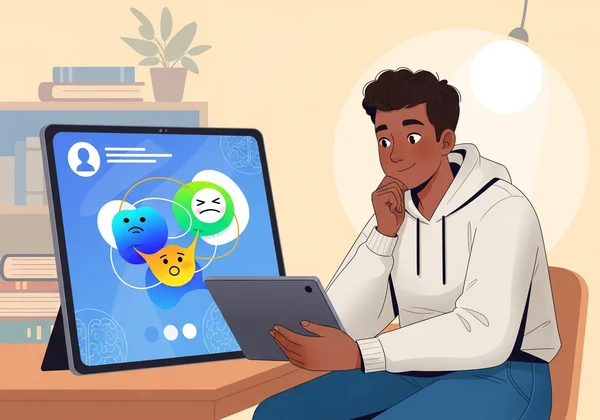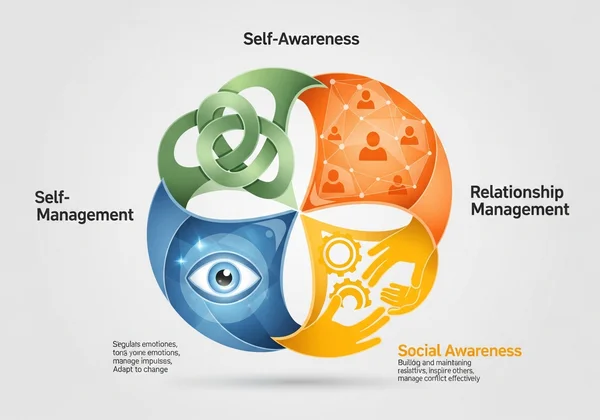EI Test for Students: Ace Exams, Boost EQ & Career Prep
November 20, 2025 | By Evelyn Reed
Welcome, students! Feeling the pressure of academics, social dynamics, or career uncertainty? It's a journey of incredible highs and challenging lows. What if you had a secret weapon to navigate it all with more confidence? Discover how enhancing your emotional intelligence (EI) can transform your college years and prepare you for the future. What is the EI test, and how can it unlock your potential?
Your path to self-discovery and growth begins now. An ei test for students is more than a quiz; it’s a mirror reflecting your emotional strengths and a map guiding you toward improvement. It provides the insights needed to build stronger relationships, manage stress, and excel in your studies. Ready to see what you're made of? Take our EI test and start your journey today.

Understanding Emotional Intelligence: Why an EI Test is Crucial for College Students
As a student, you hear constantly about IQ and grades. But another intelligence is just as crucial for success and well-being: emotional intelligence (EI or EQ). Think of it as the ability to understand and manage your own emotions, while also recognizing and influencing the emotions of others.
For college students, EI drives success beyond the classroom. It helps you stay calm before a big exam, collaborate effectively on group projects, and build a supportive network of friends. It’s the key to resilience against setbacks and the foundation for effective leadership.
Beyond IQ: Understanding Your Emotional Toolkit
While IQ was once seen as the primary predictor of success, we now know that's only half the story. While IQ represents your cognitive abilities—like reasoning and problem-solving—EI represents your emotional toolkit. This includes your ability to handle pressure, empathize with a roommate, or motivate yourself to finish a term paper when you'd rather be doing anything else.
Imagine two students with the same high IQ. One gets easily frustrated by difficult assignments and avoids group work due to social anxiety. The other uses their self-awareness to manage frustration, communicates effectively with teammates, and builds strong relationships with professors. Which one do you think is more likely to thrive? Developing your EI is like upgrading your internal operating system for better performance in all areas of life.
The Four Pillars of EI: Self-Awareness to Relationship Management
Emotional intelligence isn't a single skill but a combination of four interconnected abilities. Understanding them is the first step to mastering them.
-
Self-Awareness: The foundational pillar, this involves recognizing your own emotions and understanding their impact on your thoughts and behavior. It encompasses knowing your strengths, weaknesses, and true motivations.
-
Self-Management: Building on self-awareness, this skill helps you control impulsive feelings, manage stress effectively, sustain motivation, and adapt to changing circumstances.
-
Social Awareness: This outward-facing pillar centers on empathy—the ability to understand the emotions, needs, and concerns of others. It involves picking up on emotional cues and navigating social situations with comfort.
-
Relationship Management: The culmination of the other pillars, this skill enables you to develop and maintain healthy relationships, communicate with clarity, inspire others, excel in teamwork, and manage conflict constructively.

Maximizing Academic Success & Well-being: The Impact of Your EI Score
Emotional intelligence isn't just a "nice-to-have" soft skill; it's a powerful driver of academic success. Students with higher EI often achieve better grades, experience less burnout, and have a more positive university experience. They are better equipped to handle the demands of higher education because they can manage both their workload and their inner world.
By developing your EI, you can turn academic challenges into opportunities for growth. Instead of being derailed by stress or a lack of motivation, you can use your emotional skills to stay on track, focused, and resilient. To see where you currently stand, discover your EI score with a simple assessment.
Managing Exam Stress and Academic Pressure
The pressure to perform can be immense. Late-night study sessions, looming deadlines, and final exams can create a perfect storm of anxiety. High EI provides the tools to navigate this exam stress effectively. Self-awareness helps you recognize the physical and mental signs of stress before they become overwhelming.
Self-management skills, in turn, allow you to deploy calming techniques, such as deep breathing or mindfulness, to reduce anxiety. Instead of panicking, you can approach exams with a clear and focused mind. This emotional regulation is often the deciding factor between a good performance and a great one.

Enhancing Focus and Motivation for Study
Procrastination is a common struggle for students. Why? Often, it's not laziness but a result of emotions like fear of failure or feeling overwhelmed. Emotional intelligence helps you understand these underlying feelings and manage them. A student with strong self-management skills can set clear goals, delay gratification, and maintain study motivation even when the material is challenging.
By understanding what drives you (self-awareness) and creating a positive, motivating environment (self-management), you can transform your study habits. This leads to more efficient learning, better retention of information, and ultimately, a more rewarding and successful academic journey.
Boosting Your EQ: Building Stronger Friendships & Social Connections
College is a time of immense social growth where you form friendships that can last a lifetime. Your ability to improve social skills is directly tied to your emotional intelligence. EQ is the currency of human connection; it allows you to build rapport, communicate with empathy, and navigate the complexities of university social life.
People are naturally drawn to those who make them feel understood and valued. By developing your social awareness and relationship management skills, you become a better friend, a more effective collaborator, and a more respected member of your community.
Improving Communication and Conflict Resolution
Misunderstandings with friends, roommates, or group members are inevitable. How you handle them is what matters. High EI equips you with the skills for effective conflict resolution. Instead of letting disagreements escalate, you can listen empathetically to the other person's perspective (social awareness) and express your own needs clearly and respectfully (relationship management).
This ability to communicate constructively builds trust and strengthens relationships. It turns potential conflicts into opportunities for deeper understanding and connection, fostering a positive and supportive social environment around you.
Navigating Group Projects and Teamwork Dynamics
Group projects can be one of the most stressful parts of college life, but they are also a fantastic training ground for the professional world. Success in teamwork dynamics depends heavily on emotional intelligence. It requires you to understand your role in the group, motivate others, manage differing opinions, and work collaboratively toward a shared goal.
A student with high EI can sense when a teammate is struggling and offer support, facilitate productive discussions, and help mediate disagreements. These skills not only lead to better project outcomes and higher grades but also build your reputation as a reliable and effective team player. Curious about your teamwork potential? Try the free test and see what your report reveals.
Preparing for Career Success with High Emotional Intelligence
As you look beyond graduation, you'll find that employers are increasingly seeking candidates with strong soft skills. In fact, many studies show that eq for career success is often more important than technical ability or IQ. Companies know that employees with high EI are better leaders, collaborators, and problem-solvers.
Investing in your emotional intelligence now is one of the smartest career moves you can make. It prepares you to excel in interviews, adapt to workplace culture, and climb the leadership ladder. An EI test can provide a baseline, showing you which skills to highlight on your resume and which to focus on developing.
Excelling in Job Interviews and Networking
A job interview is a high-stakes social interaction. Your ability to build rapport with the interviewer, communicate your strengths confidently, and manage your nerves can make all the difference. High EI allows you to read the room, tailor your answers to the interviewer's cues, and leave a lasting positive impression.
Similarly, networking is all about building authentic connections. Emotional intelligence helps you move beyond transactional conversations and create genuine relationships. It enables you to listen actively, show sincere interest in others, and build a professional network that will support you throughout your career.

Adapting to Workplace Challenges and Leadership Roles
The professional world is full of workplace challenges, from difficult colleagues to changing project requirements. Your resilience, adaptability, and problem-solving abilities will be tested daily. Emotional intelligence is your anchor, helping you stay calm under pressure, embrace feedback, and navigate complex office politics with grace.
As you advance in your career, EI becomes even more critical for leadership roles. Great leaders inspire, motivate, and empathize with their teams. They create environments of psychological safety where people can do their best work. Developing these skills as a student gives you a significant head start on your path to becoming a respected and effective leader.
Your Pathway to a Brighter Future: Start Your EI Journey Today
Your time as a student is a unique opportunity for growth—not just academically, but emotionally and personally. By understanding and developing your emotional intelligence, you are investing in a future where you can handle stress, build meaningful connections, and achieve your professional goals. It’s the key to unlocking your full potential.
Don't just wonder about your emotional strengths. Discover them. The journey to a higher EQ begins with self-awareness. An online EI test is the perfect first step, providing you with a personalized snapshot of your emotional toolkit and actionable insights for growth. Are you ready to take control of your success? Start your journey on our homepage and unlock a more empowered you.
Frequently Asked Questions About EI for Students
What is a good EI score?
There isn't a universal "good" score, as emotional intelligence is complex and context-dependent. Instead of focusing on a single number, it's more valuable to view your results as a profile of your unique strengths and areas for development across different EI competencies. The free EI assessment on our site is designed to give you this nuanced insight, helping you create a personal growth plan.
How to improve emotional intelligence?
Improving EI is an active process. Start by practicing mindfulness to increase self-awareness. To improve self-management, identify your stress triggers and develop healthy coping strategies. Enhance social awareness by actively listening to others and trying to see situations from their perspective. Finally, practice clear communication and constructive feedback to boost your relationship management skills.
Are people with higher EQ more successful?
Research consistently shows a strong correlation between high EQ and success in many areas of life, including academic performance, career advancement, and personal relationships. While IQ gets you in the door, EQ is what helps you thrive once you're there. It's the key to navigating challenges, collaborating with others, and leading effectively.
How can an EI test help my career?
An EI test provides a clear-eyed view of your soft skills, which are highly valued by employers. By identifying your emotional strengths, you can highlight them in your resume and interviews. By pinpointing areas for growth, you can proactively develop the skills needed for leadership and teamwork. It gives you a competitive edge in the job market and prepares you for long-term career success.
What is the difference between IQ and EQ?
IQ (Intelligence Quotient) measures your cognitive and logical reasoning abilities—your capacity to learn. EQ (Emotional Quotient) measures your emotional intelligence—your ability to perceive, understand, and manage emotions in yourself and others. While a healthy IQ is important for grasping complex subjects, a strong EQ is essential for applying that knowledge effectively in the real world.